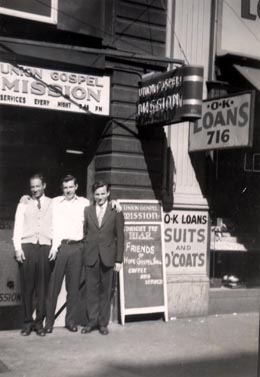On August 21, 1932, Seattle's Union Gospel Mission, with the support of several local churches, begins its efforts to provide food and spiritual sustenance to the city's growing population of homeless men. Spurred into action by the devastation of the Great Depression, the churches sponsor food drives to support the mission's program to feed the hungry. In the first year alone, and on a budget of less than $1,500, meals are provided to more than 18,000 men. The mission stays true to its Christian roots, and each meal is served with a generous portion of gospel teaching.
Food and Faith
The Seattle Union Gospel Mission got its start in April 1932 when Peter MacFarlane (b. 1910), a clergyman from Minneapolis-St. Paul, met with local church leaders to plan an aid program for Seattle's homeless fashioned after the Twin Cities' Union Gospel Mission, which had opened in 1902. The country was in the depths of the Great Depression, and Seattle's Pioneer Square area was filled with desperate and destitute men. The churches agreed to work together to address these men's needs, and on August 21, 1932, the Reverend Francis O. Peterson (1890-1986) of Minnesota opened the mission's first soup kitchen at 716-1/2 1st Avenue.
As the Depression eased in the late 1930s, the Seattle organization was able to expand its efforts to also help homeless women and children and to provide additional services. By 1940, the mission had established an employment bureau, a clothing outlet, and a facility for women and children. During World War II a servicemen's center was opened, and in the post-war years a housing shelter for homeless men was established in 1951 and a women's shelter in 1958.
Seattle's Union Gospel Mission continued to grow over the following decades to provide a wide range of services to those in need, including such things as housing, medical care, employment assistance, and drug and alcohol recovery programs. By the first decade of the twenty-first century, the mission was providing more than 400,000 meals a year and nearly 128,000 overnight stays to homeless men, women, and children -- and each meal still comes with a liberal serving of Christian teachings.

